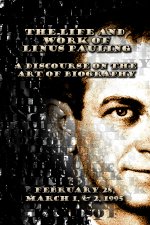Videos: Session 4: Historians and Contemporary Scientific Biography
“Writing the Biography of a Living Scientist: Hans Bethe.”
S.S. Schweber (Physics, Brandeis University)
32:59 - Transcript Available
Schweber conveys the details of his evolution as a biographer before discussing his experiences chronicling the life of Nobel laureate physicist Hans Bethe. After providing a capsule summary of Bethe's experiences and personality, Schweber enumerates a few of the challenges that he encountered in attempting to compose a history of the scientist's life. One such challenge was the need to navigate through an overwhelming trove of archival material related to Bethe and his contemporaries. Schweber concludes with a detailed comparison of Bethe's life with that of fellow physicist George Gamow.
“Historians and Contemporary Scientific Biography.”
Frederic L. Holmes (History, Yale University)
37:35 - Transcript Available
Holmes devotes the bulk of his presentation to a discussion of the complexities faced by biographers who are writing about subjects that are still alive. Using examples from his research on Hans Krebs and the Meselson-Stahl experiment, Holmes concludes that interview data acquired, in person, from the biographer's subject, often "provide more drama than understanding." That said, Holmes is keen to point out that archival documents "are not transparent witnesses to historical truth, and memories, even when incorrect in details, still provide irreplaceable clues about the subjective experience of the original event."
“Tales In and Out of 'Millikan's School.'”
Judith Goodstein (Archives, California Institute of Technology)
36:22 - Transcript Available
Goodstein recounts the numerous obstacles that she faced in researching and writing the history of Caltech, a process which spanned the better part of a decade. Questions as to when to begin and end the institutional history were difficult ones with which to wrestle, particularly as Goodstein had been a member of the Caltech staff for over twenty years by the time of the book's publication. Narrowing the biographical scope of a potentially-sprawling topic and addressing contentions of anti-Semitism also posed momentous challenges to the author. Goodstein closes by sharing a number of intriguing anecdotes from Caltech's colorful past, including several related to her book's title character Robert Millikan, about whom Goodstein notes: "Stories about Caltech's 'chief' are legion; about half of them are true."
“Manuscript Collections in the Biographical Enterprise.”
Robin Rider (Special Collections, Stanford University)
11:13 - Transcript Available
Rider discusses the task of biography writing from the vantage point of archives and archivists. In reflecting upon the papers delivered by Schweber, Holmes and Goodstein, and noting the details of Stanford University's purchase of the Alan Ginsberg Papers, Rider emphasizes the importance of personal papers in the building of archival collections. Rider likewise notes the emerging possibilities and pitfalls awaiting large-scale archival digitization programs, such as that proposed for the Ava Helen and Linus Pauling Papers.
“Remarks on the Writing of Biography.”
John L. Heilbron (History, University of California, Berkeley)
17:43 - Transcript Available
Heilbron speaks to issues of trust and continence in the writing of biographies of contemporary scientists. In reviewing the presentations of Schweber, Holmes and Goodstein, Heilbron suggests that trust between author and subject is necessary to the biographical enterprise, and that there is more reason than not to believe that an honest portrayal of one's subject will arise out of a trusting relationship. Heilbron also emphasizes the importance of self-restraint on the part of biographers -- the idea that, rather than straining to capture a subject's life in full, it is wiser to maintain a narrower focus, in part to create a more useful product for the reading public.
Watch Other Videos
Session 1: Linus C. Pauling Day Lecture
- Ken Van Holde - Introduction of Francis Crick.
- Francis Crick - “The Impact of Linus Pauling on Molecular Biology.”
Session 2: The Biographer's Picture of Linus Pauling
- Fred Horne - Session Introduction: “The Biographer's Picture of Linus Pauling.”
- Tom Hager - “The Bootlegger's Son: Or the Stochastic Method in Biography.”
- Ted Goertzel - “Analyzing Pauling's Personality: A Three Generational, Three Decade Project.”
- Robert Paradowski - “The Biographical Quest: Some Personal Reflections of a Pauling Biographer on the Art and Science of Scientific Biography.”
- Lily Kay - “The Biographer's Picture of Linus Pauling.”
- Derek Davenport - “Boswellizing Pauling.”
Session 3: The Personal View of Linus Pauling and His Work
- Crellin Pauling - Session Introduction: “The Personal View of Linus Pauling and His Work.”
- Matthew Meselson - “Linus Pauling as an Educator.”
- Ken Hedberg - “The Human Side of Linus Pauling.”
- William Lipscomb - “Reflections.”
- David Shoemaker - “My Memories and Impressions of Linus Pauling.”
- Frank Catchpool - “Personal Reminiscences about Linus Pauling.”
Session 4: Historians and Contemporary Scientific Biography
- S.S. Schweber - “Writing the Biography of a Living Scientist: Hans Bethe.”
- Frederic L. Holmes - “Historians and Contemporary Scientific Biography.”
- Judith Goodstein - “Tales In and Out of 'Millikan's School.'”
- Robin Rider - “Manuscript Collections in the Biographical Enterprise.”
- John L. Heilbron - “Remarks on the Writing of Biography.”


